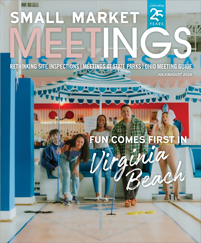Convention and visitors bureaus and convention hotels along the Gulf Coast are busy answering calls from concerned meeting planners and posting the latest information on their websites about the spill and its effects.
By mid-May, almost a month after the spill began, a number of beach towns could report that so far their areas had been little affected by the disaster.
In Gulf Shores, Ala., “we have no oil on our beaches,” said Beth Gendler, director of sales of the Alabama Gulf Coast CVB in Gulf Shores. “The oil is nowhere near here. Just to give you an idea, our offshore fishing is open up to 30 miles out.”
The same day oil washed up on the Louisiana coastline. Also, about one-fifth of the Gulf had been closed to fishing.
A day earlier Gendler’s bureau had contacted area hotels to ask about cancellations. “Most came back and said they hadn’t had cancellations and the ones that had were mostly social groups, weddings and reunions,” Gendler said. “There was one hotel that reported it had a corporate meeting of 75 people cancel because of the spill.”
In Pensacola, Fla., cancellations numbered in the hundreds of room nights, not in the thousands as some other destinations had reported, according to Laura Lee, the bureau’s public relations director. To help make its guests worry less about their future bookings, the Hilton Pensacola Beach had instituted a 24-hour cancellation policy.
“We’re saying please go ahead and book and we will work with you,” said Lee. “We might not be impacted at all. We are anxious for the economy here if everyone bails out because of a situation that might not happen.”
Both Gulf Shores and Pensacola have Oil Spill links on their website home pages where meeting planners can go to find the latest information from a variety of sources, including the National Oceanic and Atmospheric Administration (NOAA) and from tourists visiting the area who are posting their own photos, videos and comments about the beaches on the CVBs’ Facebook pages.
By using multiple sources “people can be assured that we are providing the best information,” said Gendler.
Pensacola began posting spill information early, using a page that can be put into use when situations that impact travelers, typically hurricanes or tropical storms, affect the area.
“We wanted Visit Pensacola to be a trusted source from the beginning,” Lee said.
Having current photos and even webcams of the beach allow visitors to “see with their own eyes,” she said. “Facebook is so popular right now that it is a great way for travelers to tell each other about what is going on, and it is more believable than if it is me as the PR person commenting. We wanted them to hear it (the news) from a lot of different sources.”
Among the pieces of information on the Gulf Shores/Orange Beach site in mid-May was the fact that the oil slick was 40 to 50 miles from the western end of the island; that an odor from a controlled burn of the spill was reported in Orange Beach one day but was gone about a day later when the winds shifted and that an false e-mail had been circulated stating Alabama’s governor had ordered the state’s beaches closed.
Meeting planners and travelers will soon be hearing more about the fact that Florida’s coastal destinations are open for business. British Petroleum, operator of the oil rig that exploded, agreed in mid-May to give Florida $25 million for an advertising campaign.











